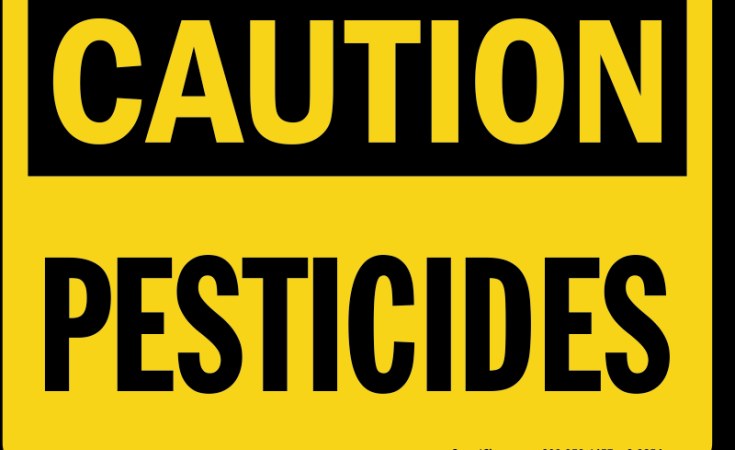As use of pesticides by African farmers rises, effective strategies are needed, writes Nelson Mandela Ogema.
With Africa's population expected to double by 2050, according to UN estimates, pesticides that can protect crops and increase food production are in increasingly high demand.
Between 2000 and 2019, the use of pesticides in agriculture across Sub-Saharan Africa rose from 64,000 metric tonnes to 108,000 metric tonnes, according to market data firm Statista.
But most farmers in Sub-Saharan Africa are unaware of the effects of these chemicals on their health and ecosystems, experts say, and pesticides are often misused.
"Agriculture is the major economic activity in Sub-Saharan Africa," explains Daniel Otaye, a plant pathologist and senior lecturer at Kenya's Egerton University tells SciDev.Net.
"Agricultural production in this region is faced with challenges including pests and diseases leading to low productivity. In response to pest and disease pressures, there has been a dependency on agricultural pesticides."
According to Otaye, the most commonly used pesticides in Sub-Saharan Africa belong to a group of endocrine disruptor compounds and include dichlorodiphenyl trichloroethane, known commonly as DDT.
"Most of these pesticides, though offering tangible benefits when used, present various health and environmental challenges in Sub-Saharan Africa," Otaye adds.
A study published last year in the International Journal of Environmental Research and Public Health found a link between pesticides use and health problems such as disorders that affect the brain or reproduction.
'Misuse and poisoning'
Otaye tells SciDev.Net that the widespread adoption of pesticides in Sub-Saharan Africa suggests that many users are new, inexperienced and typically ignorant of the consequences of pesticide use, even when applied properly.
"Lack of proper regulation and adequate training of farmers increases the risk of widespread pesticide misuse and even poisoning," he says. "Pesticides are toxic to humans and their handling and use should involve various precautionary measures."
The use of personal protective equipment and familiarity with first aid information are some of the precautionary measures that should be considered when applying pesticides, Otaye advises.
Nokuthula Hlanga, a postdoctoral researcher in crop science at the South Africa-based University of KwaZulu-Natal, tells SciDev.Net that the use of pesticide sprays in Sub-Saharan Africa is becoming widespread among commercial farmers, growing conventional crops.
"Conventional crops require intensive pesticide spray programmers to fend off high pests and disease pressure," she says. "Economic factors are the major driving forces of dependence on pesticides. Cost of chemical sprays are offset by high yield returns. It makes economic sense to spray rather than incur high yield losses."
Hlanga puts the increasing reliance on pesticides largely down to cost. Mechanical or manual labour for pests and disease control can be more expensive than chemical control, she explains.
"Chemical application is easily mechanised in commercial farming. This reduces time spent on operations and increases productivity," she adds.
Francis Onyekachi Nwankwo, who leads on product stewardship at the African Agricultural Technology Foundation in Kenya, says that widespread pesticides use could lead to their ineffectiveness.
"It is important to note that these target organisms that pesticides control
develop resistance over time, which sufficiently informs why [dosage] recommendations are not followed," he explains.
"For instance, a farmer who applies the required dose to a strain of organism that has developed resistance will not get results and that directly informs increased dosages which may actually make the target organism a super bug, or it kills it but damages the environment, depositing more than the tolerant levels of these chemicals to be consumed by humans."
Safe practice methods
According to Hlanga, the application of pesticides through drip irrigation for soil-borne pests is safe and reduces drift to non-target crops.
According to the UN's Food and Agriculture Organization, drip irrigation involves the use of small diameter plastic pipes with outlets called emitters or drippers to pour water onto the soil at very low rates to affect only the part of the soil in which the roots grow.
Nwankwo says that agriculture in Africa has always been largely practised by resource-poor farmers who sometimes misuse pesticides.
"The rampant use of these chemicals, under the adage, 'if little is good,
a lot more will be better' has had serious detrimental effects with human and other life forms," he tells SciDev.Net.
Nwankwo calls for key stakeholders such as governments, private organisations, service providers and farmers' associations to collaborate to promote the proper use of pesticides to control pests and diseases.
He adds: "The increased dependence on pesticide is simply as a result of various actors not playing a coordinated role to actualising the scientific aspect of agriculture. What is largely experienced in Africa is that actors are working in silos without coordination.
Nwankwo says that the use of biotechnology-derived products has shown to be a way out, as in the case of a cowpea commercialised in Nigeria and Ghana that is resistant to the crop pest pod borer.
Meanwhile, promoting the correct use of pesticides is crucial, he says, adding: "There should be vigorous and conscious efforts to communicate with proper messaging how these chemicals should be handled."
He adds that one of the safe practice methods for the use of pesticides is following the recommended dose.
"Another emerging area that would help drive safe use and application of pesticide is the deployment and use of the services of a stewardship expert who monitors
regulatory compliance while looking at quality assurance and control of all that have to do with the pesticide," Nwankwo explains, adding that the expert could provide guidance, training, and technical knowledge for anyone involved in pesticides use.
Khumbuzile Bophela, a plant pathologist and researcher at the University of Pretoria, South Africa, emphasises that when choosing to use a pesticide, one should consider the specificity of the pest, the pathogen or organism causing a disease.
"The choice of pesticides will be determined by the knowledge of the pest or pathogen causing a disease on a specific crop," she tells SciDev.Net.
This piece was produced by SciDev.Net's Sub-Saharan Africa English desk.


